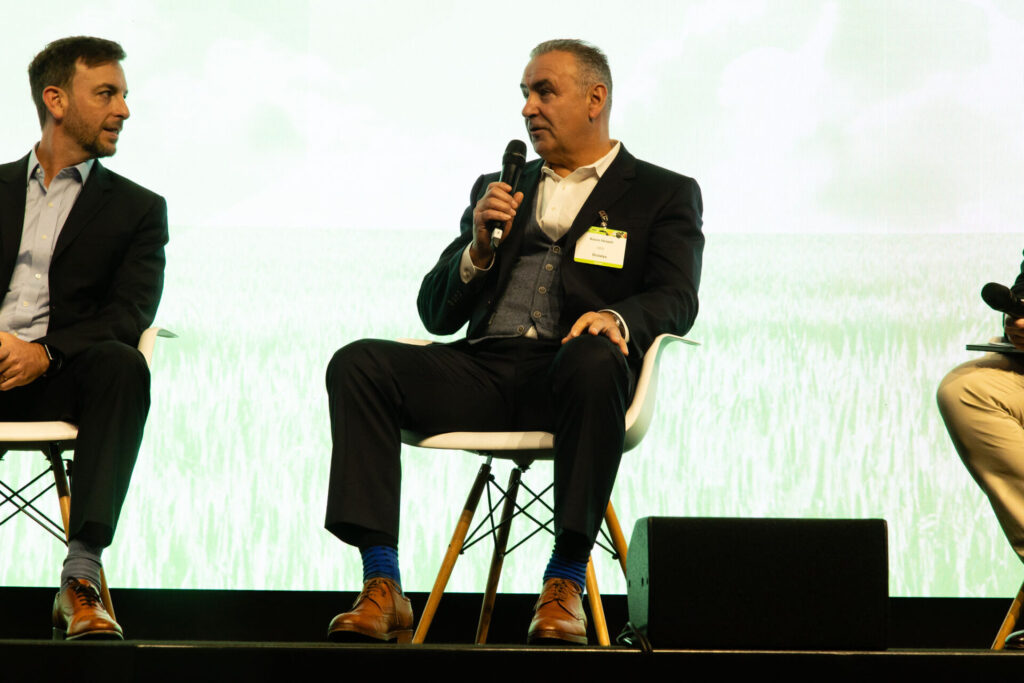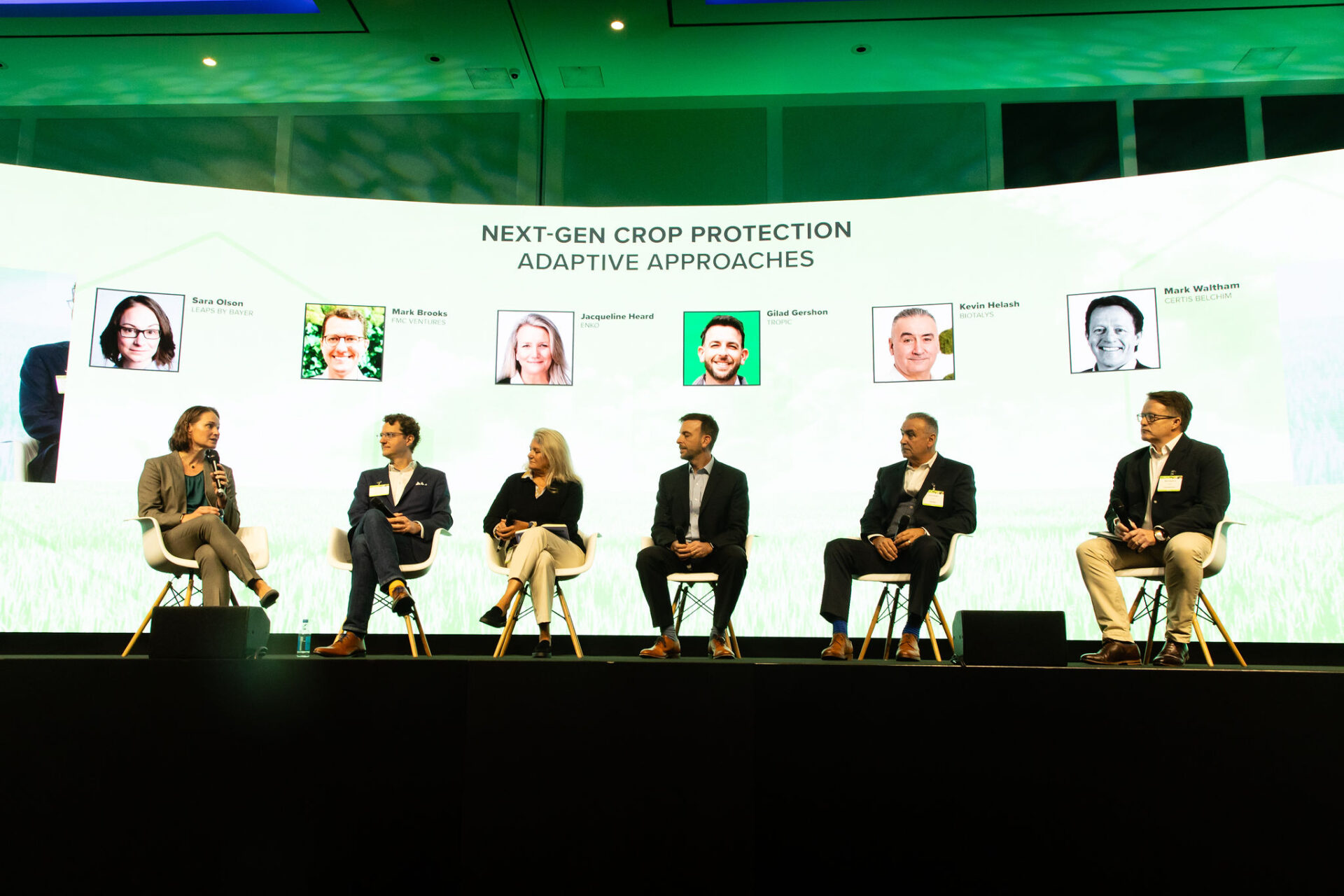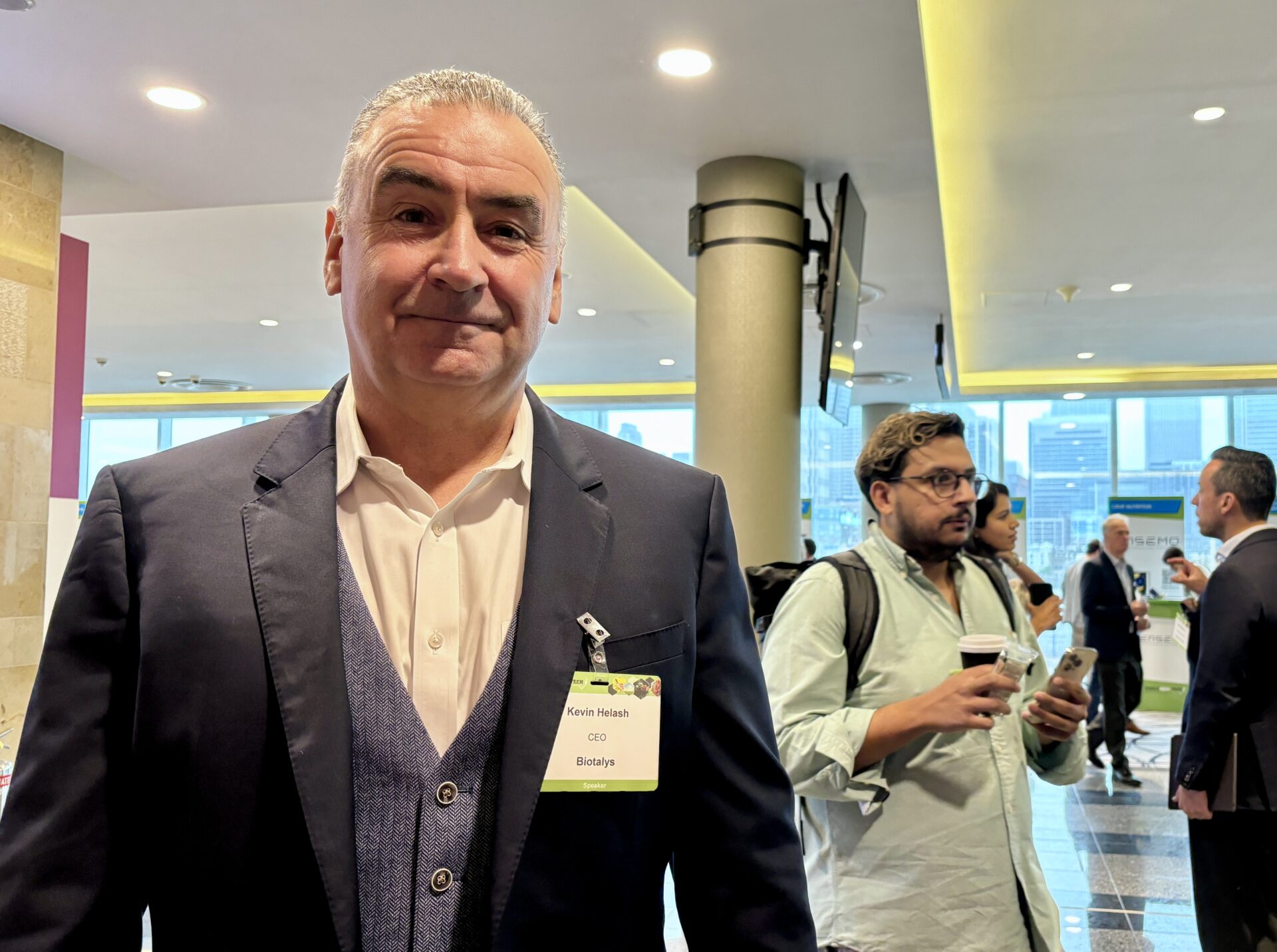“Put it this way,” says Kevin Helash, CEO at Belgium-based ag biologicals firm Biotalys, “If you’re trying to fund an eight-year regulatory process with investors who have a window of five years, there’s a disconnect there.
“I see one of two things happening,” says Helash, who took the helm last October, and has since been “streamlining” operations to extend runway as the firm awaits regulatory approvals for its first commercial products.
“Either the biofungicides, bioinsecticides markets are just going to be driven by very large players as the small guys can’t afford it. Or the innovation is going to move to countries where the regulatory environment is more favorable, like Brazil.”
‘The regulatory process has slowed down dramatically’
Helash, who was speaking to AgFunderNews at the World Agri-Tech summit in London earlier this month, added: “The regulatory process in Europe has always been slow, but in the US, it was relatively quick before covid, and now it’s quite slow. And they know it. In fact, we were just in Washington lobbying to get more funding for the EPA.
“So for [Biotalys’ first biofungicide product] EVOCA, we’ve been in the process for over three years, and we’re still waiting. The EPA’s job is obviously to make sure that there are no off target detrimental effects on aquatic life, pollinators, humans, and so on, but they used to be able to get it done in well under two years.
“The expectation was that we’d get EPA registration in 2022, and here we are in 2024 still waiting patiently. The problem is, the rate at which products are either becoming ineffective or coming off the market is outpacing the industry’s ability to get them through the regulatory process.”
Ultimately, he said, “We’ve got to figure out another way to get through this bottleneck in the system. There’s more than enough innovation and more than enough capital to come into the sector with a 5-8 year window [from conception to commercial launch]. But if you’re talking 10 years plus, the list of companies or venture capital people that want to come in is very small, right? So we have to cut the red tape.”
Commercial-scale production with Novonesis
EVOCA, a novel biofungicide that Biotalys is currently producing at lab scale to tackle the devastating fungal diseases botrytis (‘gray mold’) and powdery mildew, will be manufactured at a commercial scale via microbial fermentation by partner and biomanufacturing giant Novonesis, said Helash.
“As soon as we get EVOCA registered by the EPA, then we’ve got to apply for equivalency for [producing EVOCA in] a microbial host strain that is proprietary to Novonesis, and then we’ll be ready to go.”
‘We have the ability to create multiple modes of action for the same pathogen’
Founded in 2013 as a spin-off from the VIB (Flanders Institute for Biotechnology) and listed on Euronext Brussels since July 2021, Biotalys has carved out a distinct path in the biologicals space by deploying highly-stable proteins found in a particular class of ‘heavy chain’ antibodies produced by camelids such as llamas. Biotalys then expresses these in genetically engineered microbes in fermentation tanks.
According to Helash: “What’s exciting is that we have the ability to create multiple modes of action for the same pathogen and we can combine modes of action together to create new molecules. So on a [fungal] cell wall, there’s different antigens that perform functions. Every one of those represents a potential mode of action to mitigate the reproductive cycle of that cell.
“And if there are 100 different sites that do that work, theoretically, we can create 100 different modes of action and combine them.”
He added: “Our second biofungicide product, Biofun-6, which is in field trials now, targets botrytis, powdery mildew and anthracnose in high-value fruits and vegetables. So as we continue to develop our platform, we’ll add more and more pathogens [to the target list], but also seek more and more effective control for pathogens we already target.
“The general consensus in the industry is that proteins would generally be described as the most stable, and then peptides, and then RNA. So because of the structure of our products, we have seen very good shelf-life, so we claim two years ambient shelf-life with no extra handling or additional storage requirements. Farmers just add them to their water during their spray application, mix it up, and away they go. They are also very compatible with other products [they may be mixed with in irrigation water].”
Biocontrol products: ‘There’s zero room for poor performance’
Biologicals must “replicate the performance of synthetic chemistry,” added Helash, “because, from a farmer’s perspective, there’s zero room for poor performance when you’re talking about a fungicide or an insecticide, whereas if you apply a biostimulant and it doesn’t work, it’s frustrating but the crop will not go backwards.”
He added: “What we’ve seen with EVOCA on botrytis control in grapes as part of an integrated pest management program, is that if you substitute EVOCA at flowering stage and you use synthetics on the front and back end, the overall performance is as good or better than the full synthetic program.”
But what about replacing synthetics completely?
According to Helash: “I foresee a day when we have three or four or five different modes of action in the marketplace and we could potentially do that, but we would never recommend doing the same mode of action three sprays in a row all the time. I mean, you’ll develop resistance overnight, right?
“So we are just providing a new tool for growers to use against [synthetic crop protection] products [to which pathogens] are developing increased resistance, so the performance is coming down. There are also a lot of products that are coming off the market just by regulatory agencies pulling them, so the tools available to the farmer continue to shrink.
“It’s then our challenge as an industry to give them enough options to continue to produce their crops.”

‘I restructured the company to run it quite a bit leaner’
Helash, who has spent his entire career in the agrifood industry, was inspired by Biotalys’ unique approach to crop protection when he joined as CEO last October, but recognized that he quickly needed to cut costs to extend runway given the uncertainty over regulatory timelines.
“I restructured the company to run it quite a bit leaner, taking out about 25% of our operating costs,” said Helash. “For me, it’s all about focus. When you’re a company of 62 people, you can’t be everything to everyone all the time. So we’re really focusing on fungicides. We have a collaboration agreement in place with Syngenta for our insecticide program. And we did the Novonesis agreement [to speed up commercialization of the EVOCA biofungicide] so we’re just getting all of the building blocks in place so that when we get EPA registration, we’re ready to go.”
Biotalys has “a significant lead over others in the sector on the protein side, and we intend to keep that lead,” claimed Helash, “although we certainly envision there will be lots of other players coming in behind us. But we have a massive market opportunity here.
“If you think about the ability to combine modes of action, and if you have 10 products and you combine them six different ways, you’ll see the numbers of products you can create are in the thousands.”
He added: “We think that the era of proteins, peptides and RNA is going to be the bridge between traditional biologicals and chemistry. In fact, I would argue that what we have is not a biological it’s sort of a new class, something between a microbe and a plant extract and hardcore chemistry.”
EVOCA’s mode of action “basically stops the replication of the [fungal pathogen’s] cell,” said Helash. “It’s not a preventative, it’s a killer. And in our 2.0 platform, we are very specifically targeting the antigens on the cell wall to mitigate them.”

‘In crop protection, farmers’ tolerance for unpredictable performance is almost zero’
So aside from regulatory challenges, what is holding the ag biologicals market back?
“I can tell you honestly from firsthand experience, when you go to see a farmer and you talk about a biological, the reaction is, ‘Oh, it’s expensive, it doesn’t work,’ or it works amazing one year, and the next year it hardly works at all,” said Helash. “And in crop protection, farmers’ tolerance for unpredictable performance is almost zero. That said, they need new products and they don’t care if they’re synthetic or biological; they care that they work.”
‘The speed of innovation is far outpacing the speed of regulatory’
Sitting on a panel with Helash at the World Agri-Tech summit in London, FMC Ventures managing director Mark Brooks said that many biologicals, “really in terms of pure efficacy, are now as good as chemistry, and that’s a major breakthrough.”
But he cautioned: “It takes forever to get anything registered and that’s got to change. The speed of innovation is far outpacing the speed of regulatory.”
Dr. Sara Olson, senior director, crop science venture investments at Leaps by Bayer, added: “The pure fact that something is biological or perceived as greener is insufficient to drive change. I don’t care where the solution comes from, if it’s not rationally sensible on the farm, and there’s not some incentive driving that increased cost, increased risk, increased effort, we shouldn’t expect to see adoption.”
Further reading:





